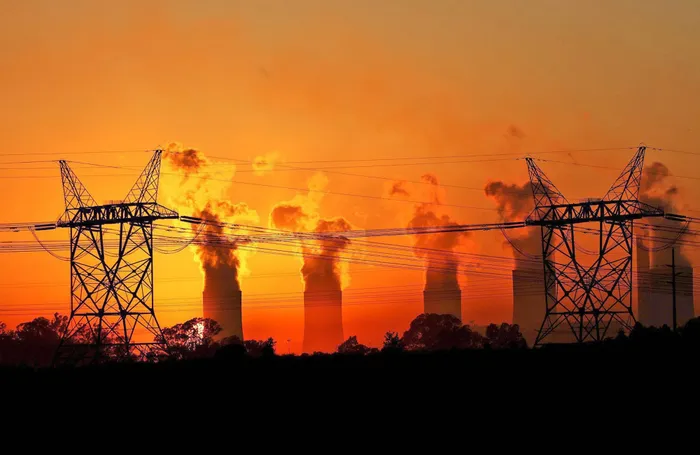Energy transition in Africa

Picture: Siphiwe Sibeko/Reuters (File) – Electricity pylons are seen in front of the cooling towers at the Lethabo Thermal Power Station, an Eskom coal-burning power station near Sasolburg in the northern Free State. Through interconnectivity, power can be made more accessible and inexpensive for everyone, the writer says.
By Clara Nwadinigwe
The need to switch from fossil-based energy systems to zero-carbon systems has grown urgent as the world works towards a sustainable future. For those who are unaware, energy transition is simply the move of energy production and consumption from sources that emit greenhouse gases to sources that are more environmentally friendly.
Through the decrease of greenhouse gas emissions associated with the combustion of fossil fuels, such as carbon dioxide, carbon monoxide, and nitrous oxide, this energy transformation aims to limit and attenuate the effects of climate change.
Majority of the world's energy is derived from fossil or carbon-based sources. According to the US Environmental Protection Agency, carbon dioxide, which is produced through the combustion of carbon fuels, accounts for 76 percent of all greenhouse gas emissions. Thus, the main cause of global warming and climate change is the burning of fuels that contain carbon. The greenhouse gases that are created when fossil fuels are burned, absorb the sun's infrared radiation and prevent it from leaving the atmosphere by reflecting it back onto the earth's surface, raising temperatures.
In response to the urgent need to transition to more eco-friendly and sustainable forms of energy, nations around the world are conducting extensive research and making significant advancements in new sources of energy, including solar, wind, nuclear, geothermal, and hydroelectric technologies.
It is anticipated that by the middle of the century, these energy sources would gradually phase out fossil fuels. To enable the integration of renewable energy sources and to ensure the dependability, efficiency, and security of energy supply, energy network upgrades and investments are required. Investing in energy efficiency will also promote accessibility, economic growth, and competition while reducing energy prices for home, commercial, and public use.
All kinds of energy resources are spread out across Africa and have a long shelf life, but they are concentrated in a few countries that periodically lack the capacity to fully utilise them. Africa needs a regional answer that goes beyond national efforts if it is to have a sustainable energy future.
Through interconnectivity, power can be made more accessible and inexpensive for everyone. For such a system to function, considerable national reforms are required to give market participants the ability to efficiently fulfil their duties as dependable energy suppliers and buyers. Governments and stakeholders need to concentrate on fostering and creating the infrastructure necessary to ensure the co-ordination of power exchanges and resource sharing among African nations.
The truth is that fossil fuels won't disappear any time soon, and even more so than coal, cheap and abundant natural gas is eclipsing the African energy market. Clean energy must thus be coupled with fossil fuels to close the continent's energy gap. For example, although metropolitan areas can optimise clean energy production from fossil fuels, rural regions can run on renewable energy. This action will improve livelihoods while simultaneously promoting trade and combating climate change. Many people may believe that 'clean coal' or 'clean natural gas' are unattainable, but the truth is that by improving these energy sources, the quantity of greenhouse gases that is released into the world can be reduced. How?
Take for instance a firebox; it heats water to steam, which turns turbines to produce power. This is generally how all fuel-based plants operate, including nuclear, coal, and natural gas. This opens up options for producing fossil fuel energy more cleanly, such as improving the firebox or developing a more effective turbine. One technique to clean the firebox is to simply use a cleaner fossil fuel. It's fortunate that methane, the main element of inexpensive, accessible natural gas, burns as cleanly as it does. Moreover, carbon capture and storage technology can significantly reduce the harmful emissions from various fireboxes.
Africa, sadly, is the region most impacted by climate change though its emissions are low relative to those of the rest of the globe. Notwithstanding the calls for a global energy transition, Africa is required to give priority to the energy poverty it currently suffers. Because the fact remains that they (Africa in comparison with the rest of the world) won't be able to fulfil the needs of the global energy transition at the same time or capacity, considering that they’re not all starting out on an equal footing.
It is only reasonable therefore that Africa integrates its numerous resources (both fossil and renewable) to build a more robust and sustainable system that can eventually adapt to the myriad of shocks it encounters. African leaders and related organisations need to adopt a more pragmatic approach to the energy transition discourse. The continent must embrace innovative methods for using fossil fuels to provide cleaner, affordable, and reliable energy while prepping the ground for renewable energy.
Nwadinigwe is an advocate for energy systems integration.
This article is original to the The African. To republish, see terms and conditions.
Related Topics: